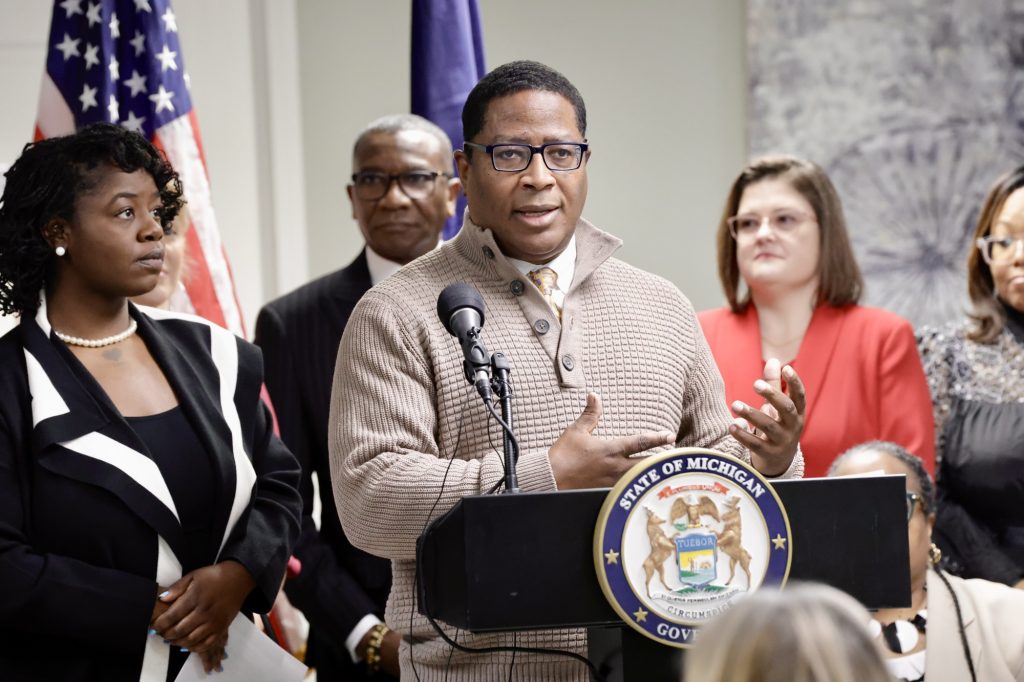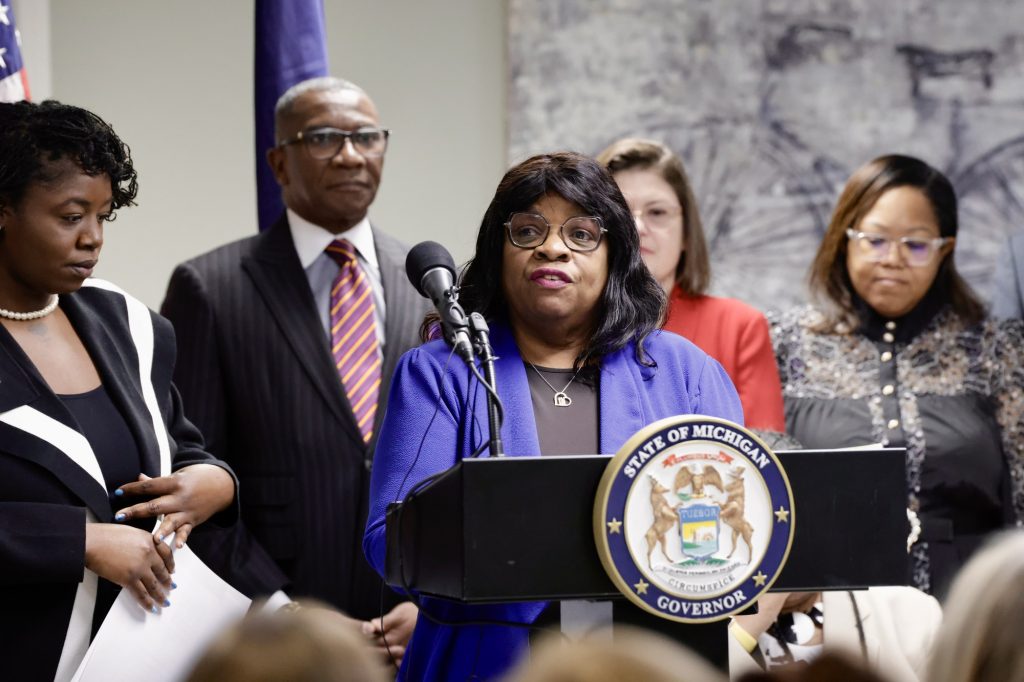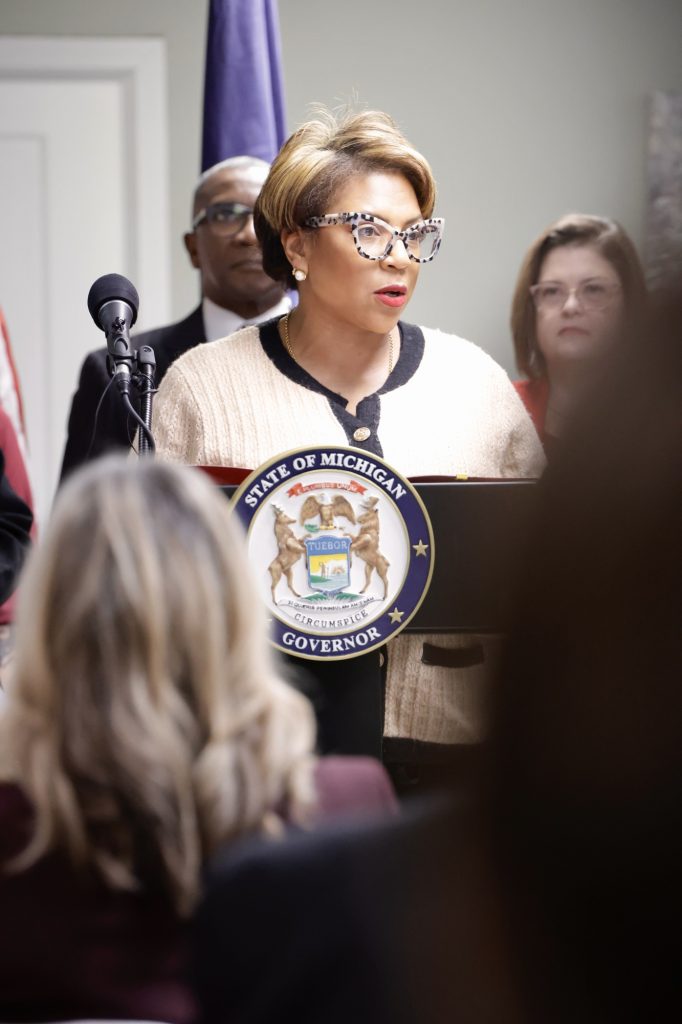Implements recommendations of Michigan Task Force on Juvenile Justice Reform
DETROIT, Mich.—Today, Lieutenant Governor Garlin Gilchrist signed first of its kind, bipartisan legislation transforming Michigan’s juvenile justice system and investing in diversion and re-entry services to better position Michigan’s youth for successful adulthoods.
“Every young person deserves the chance to be successful,” said Lt. Governor Gilchrist. “This historic legislation will hold our youth accountable while changing how they experience the justice system, expanding the available tools to create better outcomes, lower costs for families by eliminating fees, and ensure our juvenile justice system uses consistent research-based practices. It shows Michigan youth that we have their backs, that they matter, and that we believe in them and their futures. Governor Whitmer and I are grateful for everyone who helped us get this done, and we will continue to stand tall so more young people in Michigan can build a bright future.”
“This bill signing accelerates the implementation phase of a statewide collaboration that began with Lt. Governor Gilchrist’s leadership and the hard work of partners on the task force, and Michigan courts are ready for this challenge,” said Michigan Supreme Court Chief Justice Elizabeth Clement. “Young people and their families all across Michigan are counting on us to build a juvenile justice system that gives stakeholders the tools they need to provide a consistent, data-driven, evidence-based response that reflects best practices and gives youth the best chance to succeed while keeping our communities safe.”
“At the CSG Justice Center, we are delighted by the strides Michigan has taken with its most ambitious juvenile justice reform to date,” said Nina Salomon, deputy division director of the Corrections and Reentry Division at The Council of State Governments Justice Center. “This achievement is a direct outcome of a thorough, data-driven review of Michigan’s juvenile justice system and highlights the dedication and leadership of a diverse coalition of stakeholders. We are excited about the impact of this ambitious reform on Michigan’s youth and on public safety.”
“I want to extend my sincere gratitude to Governor Whitmer and Lieutenant Governor Gilchrist for their unwavering commitment and leadership in ensuring that Michigan becomes a model for youth justice,” said Jason Smith, Executive Director of the Michigan Center for Youth Justice. “These monumental reforms signify a significant step forward for our kids and communities, creating a juvenile justice system that prioritizes fairness and equity. The newly signed laws embody our collective dedication to safeguarding the well-being and future of Michigan’s children while enhancing public safety. It’s a testament to what we can achieve when we come together to create lasting change.”
“As a parent who once had a child involved in the juvenile justice system due to his mental health and as a former juvenile justice Task Force member, seeing the new juvenile justice bills pass gives me hope that children and families who have justice involvement will receive tailored support that will meet the needs of the whole family,” said Cole Williams, CEO and Founder of Cole Speaks. “We thank the governor and lieutenant governor for helping to support families like mine.”
In 2021, Governor Whitmer established the Michigan Task Force on Juvenile Justice Reform, which brought together advocates, former justice-involved youth, and law enforcement. The Task Force’s report found that in 2019, nearly half of all cases initiated in juvenile court in Michigan were for repeatedly missing school or property crimes. In many of these cases, offenders were detained or incarcerated. Over 60 percent of youth placed in detention committed a status (truancy, curfew violations, running away) or a misdemeanor offense. A patchwork of different standards and available resources created inconsistencies across Michigan’s youth justice system.
This package implements many of the Task Force’s 32 data-driven recommendations.
Diversion
HB 4625, sponsored by Rep. Brenda Carter, HB 4626, sponsored by Rep. Kara Hope, HB 4628, sponsored by Rep. Felicia Brabec, and HB 4629, sponsored by Rep. Amos O’Neal, connect youths with the resources they need by allowing juvenile courts and law enforcement to use risk and mental health screening tools to be more flexible about whether to keep a juvenile out of detention or court and keeping them in diversion programs for no more than 3 months.
“My legislation is a direct recommendation from the Juvenile Justice Task Force, which amends the Juvenile Diversion Act,” said state Representative Brenda Carter (D-Pontiac). “Michigan will now require the use of risk screening and mental health screening tools before a diversion decision is made for a minor. These tools can help in crafting the plan of support for these children, equipping them with the opportunity to change the trajectory of their young lives by getting the proper mental health care needed. This is the reform we need — these screening tools will allow a more holistic approach to mental health screening and placement in services.”
“These bills, designed with extensive research by our task force experts, will bring more fairness to Michigan’s juvenile justice system,” said state Representative Kara Hope (D-Holt). “By reducing the amount of time youths are required to spend in the system, we are helping them get on the path to their second chance sooner. I’m proud to have been a part of this bipartisan effort to foster a better future for our young people who need support and guidance in their lives more than ever. The collective effort from my colleagues on both sides of the aisle in getting these bills signed into law is truly commendable, and I’m immensely proud of their dedication.”
“Today’s bill signing is about the protection and success of our youth. The screening tools required in these newly signed laws will assist the decision-makers in choosing the best path for the child with a better idea of their needs,” said state Representative Felicia Brabec (D-Pittsfield). “My bill signed into law today instills a much-needed focus on breaking down barriers to mental health care within the system and ensures we continue to consider overall wellness during the process.”
“Each and every one of these bills within this package is shaped to make a positive impact that provides efficiency, fairness and more responsiveness to the system,” said state Representative Amos O’Neal (D-Saginaw). “Michigan, until today, did not have uniform statewide policy or the necessary tools in place to ensure that the youth who do not pose a public safety or flight risk aren’t subject to detention facilities. My bill signed into law today implements a tool to ensure those who are low-risk are not placed in such facilities.”
SB 418, sponsored by Sen. Sylvia Santana, and SB 421, sponsored by Sen. Veronica Klinefelt, allows county governments to use the Child Care Fund, the primary funding mechanism for juvenile justice in Michigan, to support evidence-driven, community-based services for juveniles that prevent recidivism and improve outcomes.
“I am proud of the juvenile justice legislation my colleagues and I have worked to uplift—providing youth with the necessary resources and support to help them overcome obstacles and reintegrate into society,” said state Senator Sylvia Santana (D-Detroit). “Stakeholders and lawmakers have been advocating for years to ensure our justice system aligns with the latest scientific research. Signing this legislation into law today is a major step toward driving equity and acknowledging the needs of young individuals to have more fair and just treatment.”
“For too long, we’ve seen young Michiganders in the juvenile justice system face disparities in treatment,” said state Senator Veronica Klinefelt (D-Eastpointe). “These bills aim to transform this system through statewide adoption of evidence-based best practices, including requiring a risk-and-needs assessment to be conducted for all juveniles. This change will help ensure that all our youth receive the support and compassion they need for a more promising tomorrow.”
Fees
HB 4636, sponsored by Rep. Emily Dievendorf, HB 4637, sponsored by Rep. Carol Glanville, SB 428, sponsored by Sen. Stephanie Chang, and SB 429, sponsored by Sen. Jeff Irwin, lower costs for families of juvenile defendants by removing burdensome fees and costs.
“This legislation reforms the juvenile justice system by helping alleviate the financial burden on families already facing immense hardship,” said state Representative Emily Dievendorf (D-Lansing). “By eliminating these unjust fines and fees, Democrats are not only investing in the future of Michigan youths and their families, but also working toward creating a fairer and more compassionate system.”
“As part of a comprehensive reform package, House Bill 4637, aligns with the recommendations of the Michigan Task Force on Juvenile Justice Reform,” said state Representative Carol Glanville (D-Walker). “By eliminating fees and costs associated with juvenile justice system involvement, this bill ensures a fairer and more equitable system. It prioritizes the well-being of our youth, striving to reduce disparities and enhance accountability. It’s a pivotal step toward a more just and effective juvenile justice system, emphasizing rehabilitation and support.”
“As a longtime juvenile justice advocate, I know that bipartisan policy changes will make a big impact for people and families impacted by the juvenile justice system,” said state Senator Stephanie Chang (D-Detroit). “We have heard so many stories of families who have been saddled with enormous debt from arbitrary fines and fees that do nothing to help young people become more productive members of their communities and, in fact, have become enormous barriers to progress. By ending most juvenile fines and fees—making our juvenile justice system more focused on rehabilitation, built on evidence-based assessments, and enhancing our Office of the Child Advocate—we will help ensure more of Michigan’s young people have the opportunity to succeed. I am grateful to have partnered with Senator Santana, Representative Hope, Representative Lightner, and others on this bipartisan effort—and am excited that Gov. Whitmer has made these common-sense changes the law in Michigan.”
“I’m proud to be part of improving the juvenile justice system in Michigan with this important package of legislation to promote community-based programs to serve kids and eliminate fees for juveniles and their families when involved in family court,” said state Senator Jeff Irwin (D-Ann Arbor).
Office of the Child Advocate
HB 4639, sponsored by Rep. Kimberly Edwards, HB 4640, sponsored by Rep. Jimmy Wilson, HB 4643, sponsored by Rep. Donavan McKinney, SB 432, sponsored by Sen. Roger Victory, SB 435, sponsored by Sen. Dayna Polehanki, and SB 436, sponsored by Sen. John Damoose, change the name of the Office of the Children’s Ombudsman to the Office of the Child Advocate and protects children by requiring the Child Advocate to protect the rights and welfare of children in juvenile facilities and allowing judges to file complaints with the Child Advocate on their behalf.
“Kids are some of the most vulnerable Michiganders and deserve special protections and support when it comes to interacting with state services,” said state Representative Kimberly Edwards (D-Eastpointe). “Informed by last year’s Juvenile Justice Task Force recommendations and my background as a social worker, I’m grateful we have been able to update Michigan law to help improve youth outcomes and community safety in the juvenile justice, foster care and adoption services systems.”
“These bills signed into law today work alongside each other to create a more safe and just Michigan juvenile justice system,” said state Representative Jimmie Wilson, Jr. (D-Ypsilanti). “The work isn’t over, though. It is important that we continue reforming and making positive changes for a better justice system. Today’s bill signing is a win for our kids and their futures.”
“This bill reflects our commitment to better oversight and protection of young people who’ve made mistakes and are worthy of rehabilitation and redemption,” said state Representative Donavan McKinney (D-Detroit). “This is about more accountability and fairness in the Michigan juvenile justice system. I’m proud to have sponsored HB 4643, and I’m grateful to see it signed into law today.”
“This legislation is the result of years of hard work and cooperation, by many members of the legislature, the administration, the Attorney General’s office, and countless others. It is a true testament to working together towards the greater good for Michigan,” said state Senator Roger Victory (R-Hudsonville). “By ensuring consistency across our state, we will improve the living conditions and outcomes for those in our juvenile system and provide them with a clear path to a better future as productive members in our communities.”
Other
HB 4633, sponsored by Rep. Kelly Breen, ensures courts consider factors like a juvenile’s developmental maturity, emotional health, mental health, tribal status, and victim impacts when deciding whether to try them as an adult.
“Revising the factors a court must consider when deciding whether a young person goes to juvenile court or general criminal court means taking a holistic view of a juvenile’s circumstances and how they, their family and the public will be best served,” said state Representative Kelly Breen (D-Novi). “A more individualized view — rather than a punitive, one-size-fits-all approach — will lead to better outcomes and more Michigan youth getting the second chance they need and deserve.”
SB 425, sponsored by Sen. Sue Shink, sets up an appellate defense system for indigent youth, ensuring they have representation in their appeals.
SB 426, sponsored by Sen. Paul Wojno, allows state government to charge adjust per-day rates paid to residential providers to better serve youth and respond to bed shortages, staff retention, and other issues.








###
